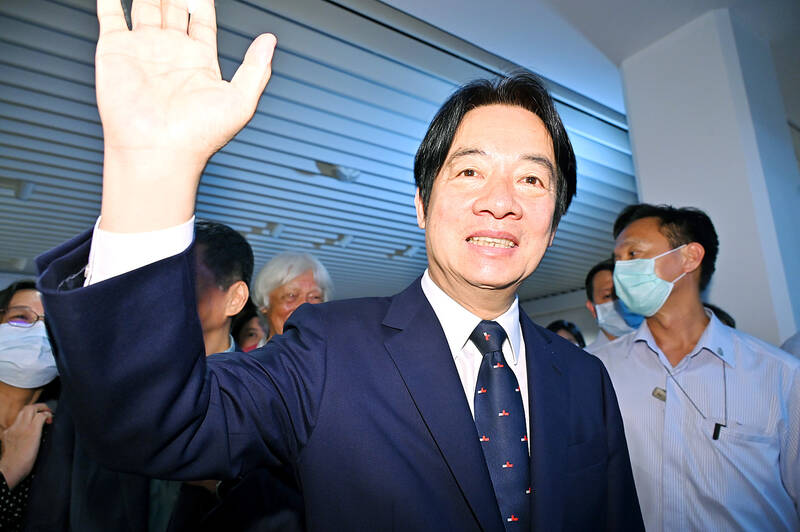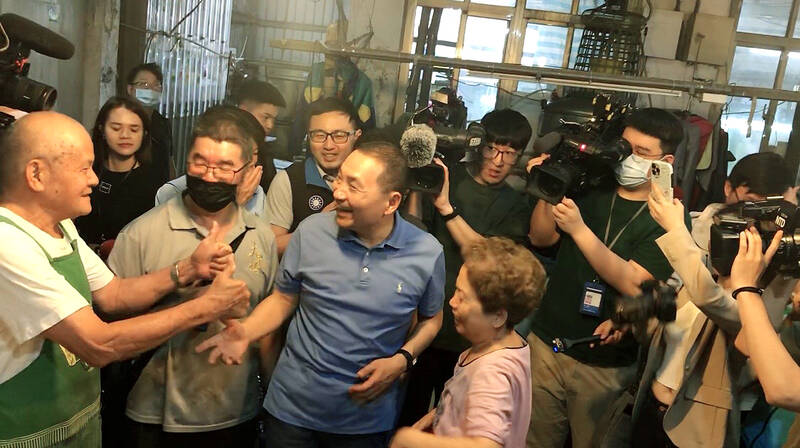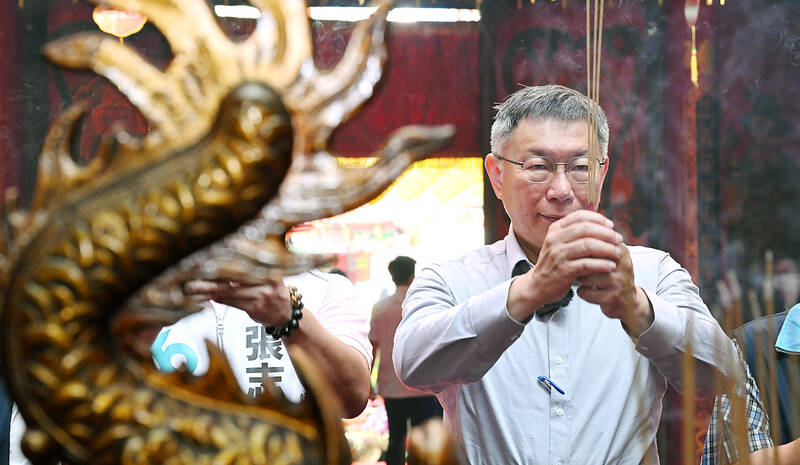It’s certainly been a pleasure watching the presidential campaign launch of Chinese Nationalist Party (KMT) candidate Hou You-yi (侯友宜) lurch painfully about like a wounded pachyderm in search of an elephant graveyard. Hou’s fall to third place in some polls last week appears early, and it might still be recoverable. But grumbling in his party about replacing him has already begun.
Indeed, all indications are that the party that twice gave us Lien Chan (連戰), the most despised politician in Taiwan, as a presidential candidate and later offered voters Hung Hsiu-chu (洪秀柱) and Han Kuo-yu (韓國瑜), is arcing along its normal descending trajectory, the North Korean missile test of electoral politics.
A KIND OF POLICY PLATFORM

Photo: Tu Chien-jung, Taipei Times
Last week the KMT doubled down on this path with Hou’s calls for nuclear power and more death penalty executions, standard KMT fare for decades (the latter is unnecessary since so many potential criminals are likely to die in traffic accidents long before they harm anyone). Apparently KMT policy institutions are not echo chambers so much as mausoleums where dead ideas are embalmed and then periodically put on display.
The lack of public policy imagination is obvious. A less obvious facet of KMT ineptitude: with years of speculation that Hou would be their man in 2024, neither Hou nor the party insisted on interesting or experimental public policies to showcase Hou’s greatness in preparation for the showdown.
Of course, that is even more true of the Democratic Progressive Party (DPP). Hou’s slide and the media buzz surrounding it are obscuring the truly urgent problem the pro-Taiwan side faces: DPP presidential candidate William Lai (賴清德) has not expanded his voter support beyond the party base. In most polls he remains below 40 percent.

Photo: Chueh Ching-lun, Taipei Times
Independent voters are staying away in droves, and for the moment the young are turning to Ko Wen-je (柯文哲), the Taiwan People’s Party (TPP) founder and presidential candidate. As long as there are three viable candidates in the race, Lai will probably win.
What should the DPP be doing? As polls show, the party’s cross-strait and foreign policies have strong public support. Clearly its weaknesses are on the domestic front. The youth turn to Ko should be viewed as an opportunity: they, and the electorate, can be won with straight talk, numbers and progressive domestic policy proposals.
Back in 2013 Dongtao Qi of the National University of Singapore explained in the China Quarterly that the DPP’s recovery in the 2012 election rested on the twin pillars of Taiwan nationalism and social justice.

Photo: Liao Chen-huei, Taipei Times
He cites survey data from 2008 showing that “nearly half of all people surveyed believed that the KMT represented the interests of the rich and powerful, while 51.1 per cent believed that the DPP represented the ordinary person.”
How many would say that today?
He supported that with an analysis showing that “even after controlling for Taiwanese nationalist sentiment, the less privileged Taiwanese were still significantly more likely to vote for the DPP in 2004, 2008 and 2012.”
DISAPPEARING MIDDLE CLASS
A decade ago class trends showed where Taiwan was heading. Since the early 1990s the number of people in Taiwan identifying themselves as middle class has fallen from around 40 percent to around 25 percent, while the number of people identifying as lower middle class has risen from 15 percent to over 20 percent over the same period.
“This ought to signal to the DPP that an overtly social justice platform can win them more votes.” I wrote that back in 2014. It’s still true today, even more so.
Every election the DPP offers a social justice headfake while pretending to bounce pass to the laboring classes. Then, in office, it’s back to hogging the ball til time runs out on behalf of business. That kind of cynical campaigning worked in the past because there were only two parties, the other was far worse, and the DPP could rely on Taiwanese nationalism to generate votes. Now the TPP, which is still working out its identity, exists as an alternative.
As social scientists have noted for decades, the working class and the small business class in Taiwan used to be two parts of the same whole. As Hill Gates wrote in her 1988 book Chinese Working Class Lives: Getting by in Taiwan: “there is no real division between Taiwan’s industrious small business people and its industrial workers.”
Indeed, one transitioned into the other as part of their life cycle: small factory workers were essentially small factory and small business owners in larval form.
Scholars have documented that in early elections, the pro-democracy side drew its strength from this class and farmers. As individuals upclassed into the urban proletariat, they became more conservative.
NATIVIST REVOLT?
Now this working class is larger than it has been for decades, and in much worse economic straits. Recent media reports have indicated that the DPP fears it could swing to the right. The party has elected to run progressive politicians at the local level to counter this. This is to its credit.
As I observed in this column on April 25 last year, the economic stagnation of the working class implies vulnerability to a populist revolt. At present none of the candidates outside the DPP offers the kind of charismatic appeals to ethnonationalism and economic populism that could spark such a social movement.
At present, would-be populists in the pan-Blue camp are hampered by its cross-strait policies and that camp’s contempt for Taiwanese culture and Taiwaneseness.
But the potential exists.
The DPP’s cynical manipulation of social justice has to end. The party must sincerely position itself as the progressive party, not merely as a party with progressive politicians in it. It must come out with policies that meaningfully tax the rich and reinvest that in innovation, green technology and infrastructure. It must do that because that will win elections, and because that will help head off a nativist populist storm that could break over Taiwan, if only it could find the right figurehead for it.
It’s not just for China that a DPP win is a national security issue.
Notes from Central Taiwan is a column written by long-term resident Michael Turton, who provides incisive commentary informed by three decades of living in and writing about his adoptive country. The views expressed here are his own.

The Democratic Progressive Party (DPP), Chinese Nationalist Party (KMT), and the country’s other political groups dare not offend religious groups, says Chen Lih-ming (陳立民), founder of the Taiwan Anti-Religion Alliance (台灣反宗教者聯盟). “It’s the same in other democracies, of course, but because political struggles in Taiwan are extraordinarily fierce, you’ll see candidates visiting several temples each day ahead of elections. That adds impetus to religion here,” says the retired college lecturer. In Japan’s most recent election, the Liberal Democratic Party lost many votes because of its ties to the Unification Church (“the Moonies”). Chen contrasts the progress made by anti-religion movements in

Taiwan doesn’t have a lot of railways, but its network has plenty of history. The government-owned entity that last year became the Taiwan Railway Corp (TRC) has been operating trains since 1891. During the 1895-1945 period of Japanese rule, the colonial government made huge investments in rail infrastructure. The northern port city of Keelung was connected to Kaohsiung in the south. New lines appeared in Pingtung, Yilan and the Hualien-Taitung region. Railway enthusiasts exploring Taiwan will find plenty to amuse themselves. Taipei will soon gain its second rail-themed museum. Elsewhere there’s a number of endearing branch lines and rolling-stock collections, some

This was not supposed to be an election year. The local media is billing it as the “2025 great recall era” (2025大罷免時代) or the “2025 great recall wave” (2025大罷免潮), with many now just shortening it to “great recall.” As of this writing the number of campaigns that have submitted the requisite one percent of eligible voters signatures in legislative districts is 51 — 35 targeting Chinese Nationalist Party (KMT) caucus lawmakers and 16 targeting Democratic Progressive Party (DPP) lawmakers. The pan-green side has more as they started earlier. Many recall campaigns are billing themselves as “Winter Bluebirds” after the “Bluebird Action”

Last week the State Department made several small changes to its Web information on Taiwan. First, it removed a statement saying that the US “does not support Taiwan independence.” The current statement now reads: “We oppose any unilateral changes to the status quo from either side. We expect cross-strait differences to be resolved by peaceful means, free from coercion, in a manner acceptable to the people on both sides of the Strait.” In 2022 the administration of Joe Biden also removed that verbiage, but after a month of pressure from the People’s Republic of China (PRC), reinstated it. The American